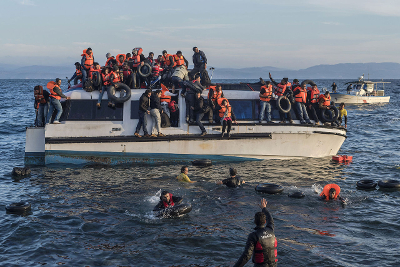
“What accounts for the existence of organizations such as Frontex and their obvious proliferation? How can it be that there is such a vast number of these international organizations in the world, if in fact, they have no real executive power vis-à-vis the nation-states and their citizens?”
Alustus! In the course of the last year, we have in Europe witnessed accelerating public debate on illegal border crossings in the European Union perpetrated by migrants. The subject has been referred to in public as mass immigration, a flood of migrants, and even as a refugee crisis (e.g. Kingseley, 2015; SZ, 2015). Illegal border crossings into the territory of the European Union last year numbered to 1.83 million. In 2014, the record was 283 500 (Frontex, 2016b).
In spite of an apparent and slight reduction in the flow of migrants during the winter months, an acceleration is anticipated as spring approaches. For instance, several media have claimed that over one million migrants will arrive in Germany in the course of this year.
It is reported that migrants will arrive predominantly from North Africa, the Near East and Central Asia. The push factor is reportedly the Arab Spring and the political confusion in its aftermath in what were once African dictatorships, the civil war in Syria and the desolate living conditions in Central Asia. The jihad organization ISIS (also known as the Islamic State) is reported to have accelerated immigration. With ever more areas of Syria and Iraq falling under ISIS control, more and more Syrians and Iraqis are driven out of their homes.
It is claimed that ISIS itself is part of the flow of refugees. It is believed that the organization is trying to infiltrate non-Islamic societies, and is therefore, sending its fighters among the refugees to Europe. For example, the bombings in Paris last November were reported as the work of ISIS fighters, some of whom had arrived in Belgium as refugees.
Frontex, the border security organization of the European Union
Whatever explanation we attach to the mass migration to Europe, public debate frequently mentions Frontex. This special organization (composed chiefly of the police and border control officials of European Union Member States) frequently appears in the discussion when expert assessments are made of how many migrants or refugees have already arrived in the territory of the European Union and how many are expected to arrive in the next few months.
Frontex likewise figures in the debate when the possibility, of even the need, is mentioned to close the borders of Europe against the rest of the world. Those in favour of closing the borders support their argument with reference to European security. One solution proposed has been that the equipment and official aid which Frontex provides should be used to achieve better control over the southern borders of the European Union, which are claimed to “leak”.
At the turn of the year, the discussion around Frontex intensified. Several European media reported a proposal on the part of the Commission to establish in place of Frontex the EU’s bigger and more powerful border and coast guard (e.g. Traynor, 2016). On receiving the approval of the Council of Ministers and the European Parliament, this proposed border guard organization would empower the EU to intervene in the border surveillance of individual Member States, even against the will of the country concerned (EC, 2015).
In public that project has been justified notably by the Schengen Agreement and the freedom of movement it guarantees within the European Union. It has been proposed that illegal immigration is likely to compromise internal mobility in the European Union and, thus, more powerful tools are needed in the hands of the Commission to combat this.
Based on what has been just recently discussed in Europe, my impression is that the right of individual Member States to decide about their borders is slipping out of their hands and actually escaping into the hand of international organizations – Frontex or possibly some other international organ. Such organs would appear to be playing an ever more prominent role in the process which shapes the understanding of what European border control ought to be.
Such an understanding about the relations pertaining between nation-states and international organizations appear to have a place in social sciences. Much of this research appears to work on the assumption of a recent and clearly visible increase in global control. For instance, the interpretation, to which the representatives of scientific realism subscribe, is that in recent years the world has seen a large number of concentrations of power or authorities, which are capable by virtue of their knowledge production dictating how individual nation-states should arrange their policies and practices. To substantiate this interpretation, researchers typically compare the policy recommendations issued by the international organizations and the reforms initiated by nation-states.
These explanations are indeed fascinating, but also problematic. Even though nation-states are in many ways networked with each other, and in spite of having their representatives in several different international organizations, it is still within the state, where policy decisions regarding nations-state itself are taken.
The question of my introduction to discuss is the following: What accounts for the existence of organizations such as Frontex and their obvious proliferation? How can it be that there is such a vast number of these kind of international organizations in the world, if in fact, they have no real executive power vis-à-vis the nation-states and their citizens?
The neo-institutional world society theory and its critique
Rather than treating the rise of all kinds of organisations as the increase in global governance, the world society theory (Boli & Thomas, 1997; Meyer, Boli, Thomas, & Ramirez, 1997) explains their emergence and the rapid increase by way of world cultural scripts that operate as a constitutive and guiding environment for states, business enterprises, groups and individuals. The scripts within the world culture, crystallised in the idea of the modern formal organization, have permeated the whole world structuring all organisations and nation-states such that they look alike.
The theory emphasizes that the international organizations are the most important embodiments of world culture. Acting as the primary carriers of world culture and as the agents of many categories of individuals and people, INGOs together IGOs translate the diffuse global identity and authority of world citizenship into specific rights, claims and prescriptions of (appropriate) state behaviour. One of these is the idea of ‘world actor’, which has made participation in world organizations some sort of ‘social imperative’ for modern nation-states. In other words, according to world society thinking, being a member in international organizations is a matter of public image. Remaining outside of them appears as backwardness.
The claims of the world society theory are plausible. It is difficult to imagine any area of society total devoid of organization. In their structures and basic functions, these organizations appear to be surprisingly similar. Yet what remains unresolved is what is accomplished with all these many organizations? A great deal of research is done in international organizations. They produce various reports on our societies and the environment setting standards and proposing policy models. Many of them provide nation-states concrete policy recommendations.
But who makes use of these organizations? How can one explain that a large number of governments and various other bodies have made a commitment to the international organizations and the work accomplished in them if the power of these organizations, in the last instance, is only imaginary?
Through the work with Pertti Alasuutari and his group, Tampere Research Group for Cultural and Political Sociology, I have learned that in order to comprehend more about the ecology of international organizations, it is necessary to shift the analytical scrutiny to local contexts, to the actual discussion about the organizations, how their founding and activities are justified, by whom such justification is attempted, for what reasons, and how the organizations seek to describe themselves, their activities and role in society.
Having analysed, among other, the OECD, the EU, the UN and the WHO and their subordinate organizations from the above-mentioned perspective, we suggest that the international organizations are indeed part of world culture. They are founded, they have members, and they are referred to, because they are believed to have power. Yet in our view, this does not mean that actors linked to the organizations or using them in public debate are mere puppets of world culture tamed to act ritualistically.
Quite the reverse. We claim that organizations are set up, joined, and referred to because by leaning on their authority we can effectively influence others’ understanding about environment and society, the assumed challenges in these, and how such challenges should be tackled. Individuals wishing to exert influence over these public understandings and so also over policymaking, network with likeminded people and set up and join organizations because they accumulate authority – or epistemic capital – as we call it (Alasuutari, Rautalin, & Syväterä, 2016).
This authority or capital is utilized in an attempt to exert influence over how the public understands the state of society and its policy solutions. Having assumed the status of institutions, the authority of these organizations affords suitable tools in the efforts of other actors not within the sphere of the organizations to exert influence over the public debate and policy decisions. The more public attention the organizations attract the greater the epistemic capital amassed.
Our research has shown that the organizations do not become authorities spontaneously but rather this takes strategic planning. In order to become an acknowledged actor in the public debate, organizations need to network with other organizations and authorities in the field. By appearing alongside these, the organizations appear to gain the approbation of global community. This is necessary for the organizations when they issue instructions for nation-states on how these should arrange their policies.
Furthermore, authority once acquired is not permanent. For instance, a failure on the part of an organization in its assumed task is likely to detract from its prestige. This is also the reason why organizations are at pains to publicly defend themselves in order to demonstrate that they are indeed needed.
Return to Frontex
Although I have not actually researched the organization, it seems to fulfil all the criteria of a modern organization. A glance at the Frontex, information about its founding and public discussion on the organization shows that the existence of Frontex can be explained by the attempts of individuals and groups to affect policy-making and practices.
According to media reports, the border officials of the Canary Islands and those of other Mediterranean countries appealed to the EU Member States already at the beginning of the 2000s for assistance in patrolling their territory. It was reported that a vast number of refugees were arriving there especially from Africa (For this discussion, see e.g. Fuchs, 2006).
As the European Union has no mandate to intervene in the border surveillance of individual Member States, it was necessary to pursue the matter with recourse to the common good. The idea of a separate European Union organization was born to undertake not only the surveillance of the maritime borders of the European Union, but also of other external borders of it.
Among the justifications for the organization was the Schengen Agreement (Frontex, 2016a). A rationally planned department was claimed to be able to harmonize the border practices of all Member States in such a way that in spite of the pressure of illegal immigration on the borders of the European Union, the free mobility within the Schengen area would not be compromised.
Such arguments were clearly appealing. Frontex (its official title being the European Agency for the Management of Operational Cooperation at the External Borders of the Member States of the European Union) was set up under a statute of the Council of Europe in 2004. Its official mission was noted as that not only of harmonizing the operative surveillance of the external borders of the European Union, but also of assisting Member States in the training of border guards, making various risk analyses of the borders of the European Union, monitoring research on the surveillance of external borders and providing support to Member States, for example, to arrange the repatriation of refugees.
Throughout the existence of the organization, Member States’ representatives have tried to ensure that it also serves their own countries’ respective interests. Nevertheless, doubts have been regularly expressed about the need for Frontex. For example, it has been claimed that Frontex has not been successful in providing sufficient surveillance of the territorial waters of the Mediterranean Member States. The organization has responded to such criticism by claiming lack of resources. It has also been vocal in pointing out that responsibility for border control still rests primarily with the Member States themselves.
Publically voiced doubts about the ability of Frontex to accomplish its mission and possible fear of a future increase in refugee flows have likely served to generate support for a common European border and coast guard. For example, the representatives of Germany and France have publicly taken a favourable stance on the Commission’s proposal to establish a new, more powerful European Union border and coast guard. These are also countries whose leaders have publicly declared that they will no longer accept to take new refugees.
It remains to be seen who or what organization in the future plays a role in European border surveillance policy. It seems certain that European border policy will be pursued in international organizations, because in the world society seems to be a shared understanding that it is through organizations utilizing their authority that we can exert influence over the public conception of society and over decisions concerning ourselves.
Speech was delivered on January 22nd at the seminar “Local and global interaction in the world society” to celebrate Professor Pertti Alasuutari’s sixtieth birthday.
References
Alasuutari, P., Rautalin, M., & Syväterä, J. (2016). Organisations as Epistemic Capital: the Case of Independent Children’s Rights Institutions. Journal of Politics, Culture, and Society, 29(1), 57-71.
Boli, J., & Thomas, G. M. (1997). World Culture in the World Polity: A Century of International Non-Governmental Organization. American Sociological Review, 62(2), 171-190.
EC (2015). A European Border and Coast Guard to protect Europe’s External Borders. Strasbourg: European Commission.
Frontex. (2016a). About Frontex: Origin.
Frontex. (2016b). Greece and Italy continued to face unprecedented number of migrants.
Fuchs, D. (2006). Canary Islands fear disaster as number of migrants soars, The Guardian.
Kingseley, P. (2015). 10 truths about Europe’s migrant crisis, The Guardian.
Meyer, J. W., Boli, J., Thomas, G. M., & Ramirez, F. O.(1997). World Society and the Nation-State. American Journal of Sociology, 103(1), 144-181.
SZ (2015). UN: Eine Million Flüchtlinge 2015 nach Europa gekommen, Süddeutsche Zeitung.
Traynor, I. (2016). Pressure to resolve migration crisis could tear EU apart, The Guardian.





